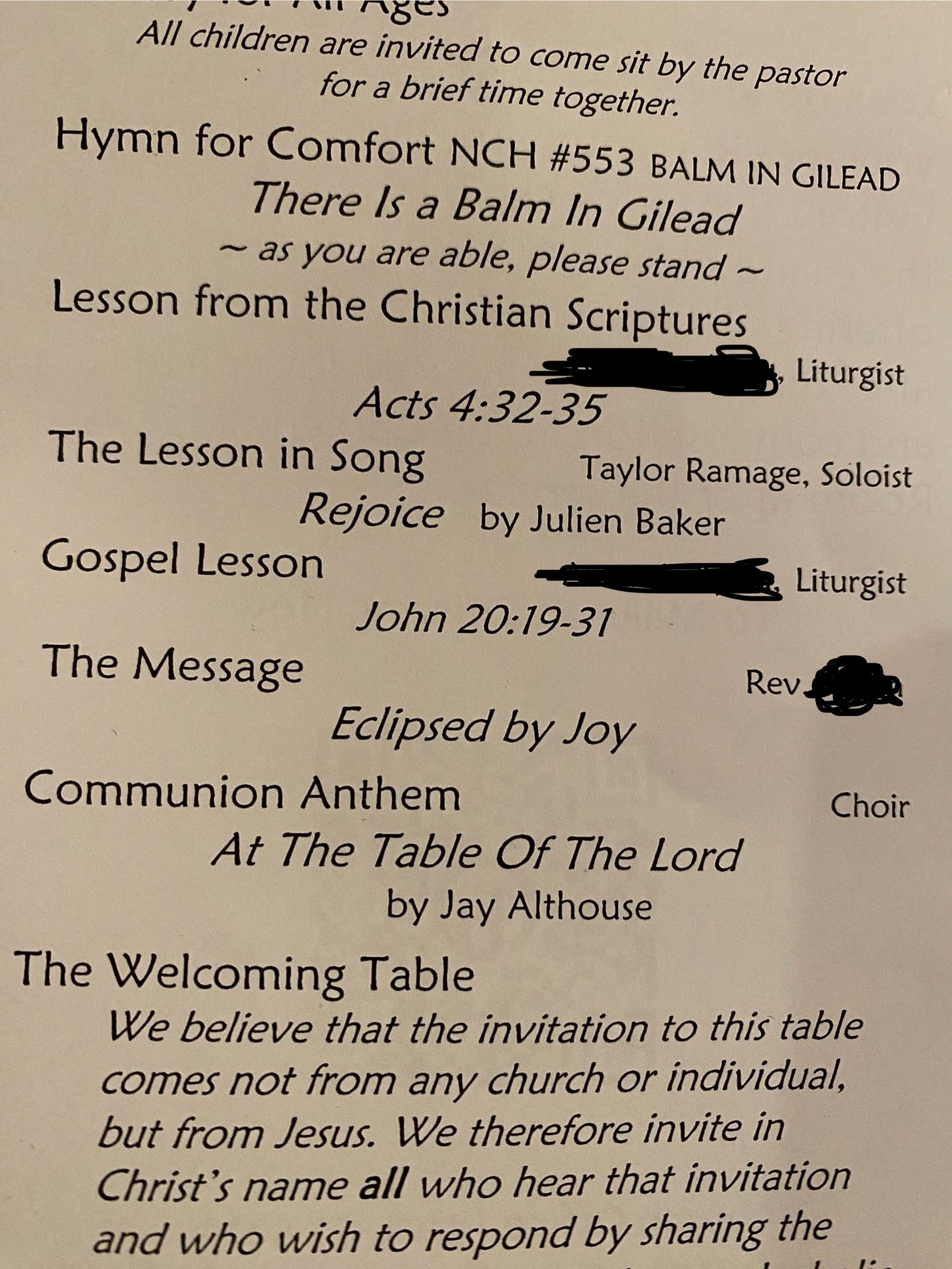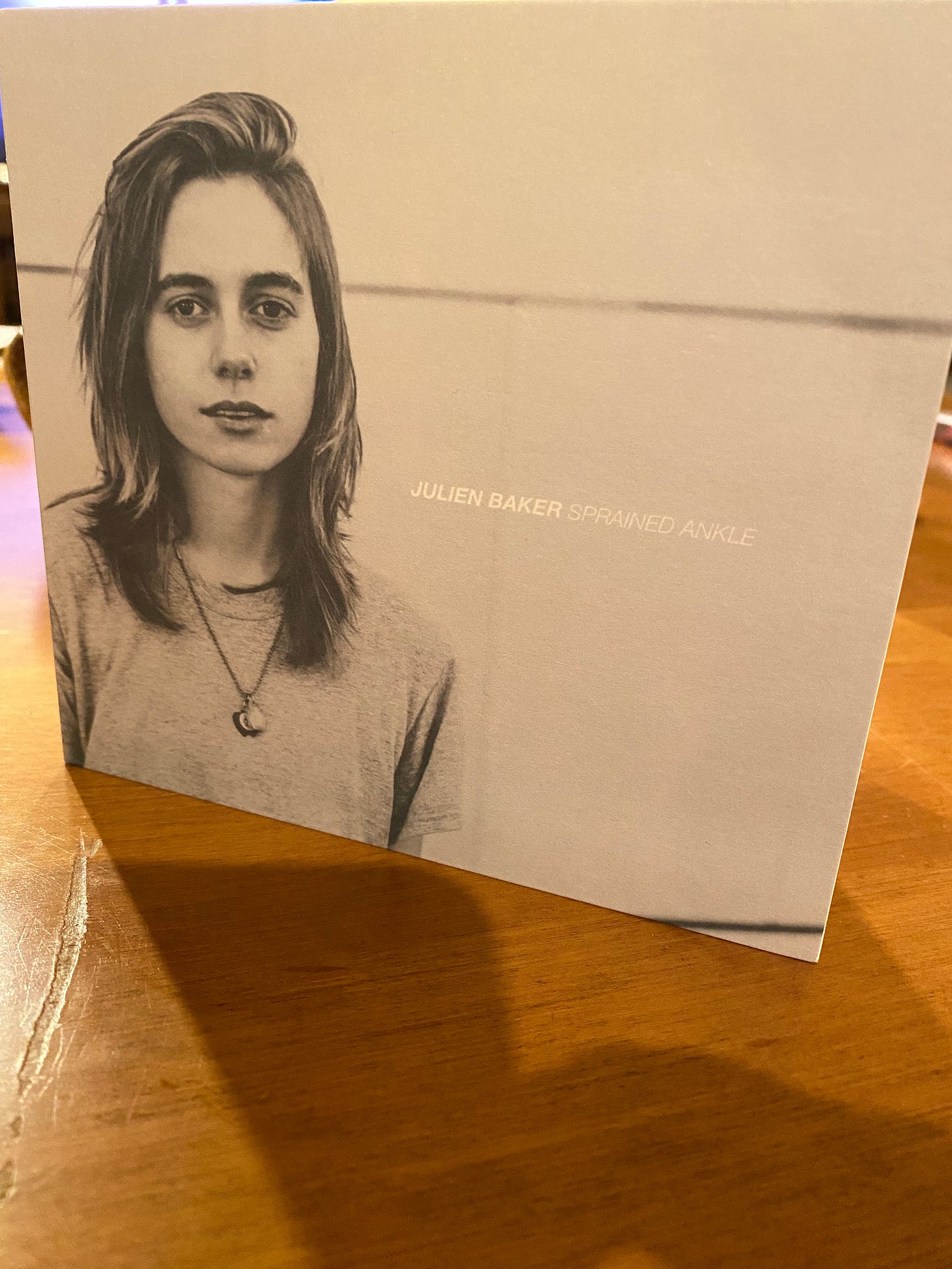Playing "Rejoice" by Julien Baker in Church
"I think there's a God and he hears either way/when I rejoice/and complain"
I’m grateful to be part of a church that, due to its focus on spirituality and the arts, is very open to all types of music being played in our Sunday services. We’re small, averaging about 20-30 people each week, so when I talk about being a church guitarist, imagine more of a coffee shop vibe in a traditional-styled sanctuary as opposed to an auditorium with a hi-fidelity sound system. Each week, I bring my guitar and modeling amp, and sometimes a physical pedal (eventually, I’ll build a pedal board). If I’m singing and playing, I share the one wireless mic with the pastor. Sometimes, we have a full band playing a song or I’ll cover something special as a solo. More often, I’m comping the hymns of the week and singing with the choir.
I mention all this to set the image in your mind, so that when you read my posts about anything musical I do in church, you feel that you (or your church musicians) could do it, too. I’m not speaking from an experience on a large worship and production team, and I’m not speaking from an evangelical praise and worship perspective either (though, I spent my formative teenage years in that world, with that music, while I was first learning guitar). Taking a genre-expansive approach to church music doesn’t have to mean high production. It just means making space for music that is outside of wherever home base is for your church.
Me playing “Rejoice” by Julien Baker is just the most recent example of this at the time of my decision to get back to writing. If you’ve been following me for a while, first of all, thank you. Second, you’ve probably seen me jump between YouTube and Substack. I recently privated most of my YouTube videos because, frankly, I became mildly terrified of doing YouTube as a YouTuber (not that my channel got all that much attention). I became unhealthily anxious about comments and visibility, but that’s not a problem I have much with writing. I’ll still probably post the occasional original song or poetry/fiction reading, but channeling all the different ways I wanted to discuss music, books, and church stuff into words that don’t have to become a video feels more freeing. But the YouTube detour did help me refine how I want to frame my thoughts about church music, which I’ll sprinkle in with posts like this discussing actual things I’ve played in church, as opposed to writing some heady, theoretical essay (that I did attempt several times a couple years ago when I first started thinking about all of this).
For my church, a progressive, queer-affirming United Church of Christ congregation, Julien Baker is not a difficult stretch at all. Like many people, I first encountered her through boygenius and since then have acquainted myself with her solo work. Faith and doubt coexist in full transparency in Baker’s songs, and her queerness is a through line for it all.
“Rejoice” is a song that, as the evangelicals might say, God put on my heart one day while I was working my day job. I knew the song already and had listened to Sprained Ankle in its entirety several times after my mother bought the album for me as a gift. So, I texted it to my music director and said, “I think this song could be good for like a Tenebrae or Good Friday vibe.” Her response was pretty much, “Great!”
We ended up using the song for the week after Easter, which not only gave me more time to learn it and practice it, but also fit thematically with the service that week. While it’s not likely that anyone other than the musicians and the pastor notices or cares whether the music thematically fits with the service, it’s still a consideration we make and one that I definitely think about a lot when suggesting a song outside of the typical hymn and choir repertoire.
Maybe one day, I’ll fully learn songs before suggesting that I can play them in church. Then again, deciding to play a song in church gives me a deadline to learn it. “Rejoice” is a simple song, but not necessarily easy. There are two chords for the verses and a riff for the chorus. The challenge for me was playing that riff and singing over top of it. I’m more used to singing over chords. In the end, I played it and let’s just say I’m grateful for the line, “when you know my name and all of my hideous mistakes.” I don’t think I hideously messed up and a few people came up to me after the service saying the song was powerful for them.
And that’s ultimately my goal in bringing any of “my music” into church. Yes, there’s a level of “I love this song and want to play it,” but most importantly, I want “my music” to fit with the theology and mission of the church. A progressive church is going to be more okay with including a song that references drug addiction, as “Rejoice” does. It’s going be more okay with a song that expresses doubt and anguish at being made by a creator, as “Rejoice” does. This is such an incredible song about God hearing us no matter what through these very real moments of depravity and isolation, things that resonate with many people in my church (and probably your church, too).
Also, I’m not the only Julien Baker fan in my church, so playing this song had yet another affect: those who attended that service also heard “their music,” but in their spiritual space. Whether church folks want to recognize it or not, many people strongly identify with the music they like and categorize others by the music they don’t like. Sometimes, genres are shorthand for demographics, which is why when I hear someone say, “I like all music except for rap and country,” I also hear the racism and classism behind it. Nearly every genre’s subcultures foster a strong sense of identity intertwined with the music. So, if someone attends a church service and hears that their music, then they might begin to feel that they themselves are welcomed in this community. Because Julien Baker is a queer artist, a lot of her fans are queer, so playing and hearing her music in my church is a subtle reaffirmation of who we include. This song in particular doesn’t mention her queerness, but it’s one of the first facts you find out when Googling her. Others in my church are recovering addicts or are close with those in recovery, so this song is a reminder that God is present with them in that specific experience.
On a practical level, one of the great things about playing this or almost any Julien Baker song in church is that it doesn’t require a full band. Most of Baker’s work is her voice and her guitar, so if you don’t have a large worship team or your team needs a break, her music could be a good fit. Though it has a learning curve, I don’t think it’s that difficult for an intermediate level player.
Tonally, I’m usually not that concerned with replicating the exact sound of any artist I cover. I just try to get in the general atmosphere. For “Rejoice,” I played my Fender telecaster through my Spark 40 amp (Baker almost exclusively plays telecasters). My patch on the Spark modeled a Fender amp, and I had a noise gate, transparent overdrive, slap back delay, and a lush-ish reverb. Even though I do have a Big Sky, as Julien does, I didn’t use it since I got close enough with the modeling patches and the Spark 40 doesn’t have an effects loop, so all physical pedals I use would be in front of the rest of the patch. I didn’t like that for this particular song.
After the service, some people let me know that the song resonated with them and they were curious about the artist. While it’s great to introduce more people to Julien Baker, the impact that it had on those folks who shared with me affirmed this direction I’ve felt called to in pursuing genre-expansive worship music.
In one sense, church music has always had a variety of genres. You see this if you pay attention and learn some history. In another sense, lots of Christians have lots of ideas about what makes “appropriate” church music. From the traditionalist who holds firmly to time-tested hymns to the modern lover of guitar and keyboard-forward songs, we tend to pick our camps and espouse good reasons for why “that other music” shouldn’t be played in our church. But I’ve found that every criticism you can fling at the style(s) of church music you think are wrong equally applies to your own favorite style. Repetitive choruses in the Hillsong-Bethel-Elevation type music? Taizé is all about repeating the same two lines at least half a dozen times. Hymns are slow and boring? How about swaying from side to side while the keyboard player holds an ambient chord?
What I believe to be true is that God hears either way. Whether the music comes from an electric guitar or a pipe organ, a chant or a rap, a full band or just one person with an instrument, all genres and instruments have liturgical potential in church. The more we recognize that, the more we encounter with clarity the same God who made the planet Saturn and the blades of grass outside our doors. What an infinitely creative God we claim to worship–let that be reflected in our music.






